
EARI-Educacion Artistica-Revista de Investigacion
Scope & Guideline
Advancing Artistic Pedagogy for a Global Audience
Introduction
Aims and Scopes
- Art Education and Pedagogy:
The journal emphasizes innovative teaching methodologies and pedagogical practices in art education, exploring how these practices can enhance creativity and critical thinking in various educational settings. - Interdisciplinary Approaches:
It promotes interdisciplinary research that merges art with fields such as technology, science, and humanities, fostering a holistic understanding of art's role in education and culture. - Cultural and Social Awareness:
The journal underscores the importance of cultural diversity, inclusion, and social justice in art education, encouraging research that addresses these themes through artistic practices. - Sustainable Development Goals (SDGs):
There is a strong focus on aligning art education with the Sustainable Development Goals, exploring how art can contribute to global challenges such as environmental awareness and social equity. - Innovative Research Practices:
The journal encourages arts-based research methodologies that reflect on the processes of learning and teaching in the arts, highlighting the value of creative practices in educational research.
Trending and Emerging
- Integration of Technology in Art Education:
Recent publications highlight the integration of technology, including virtual museums and artificial intelligence, into art education, reflecting the need for innovative teaching tools in contemporary classrooms. - Environmental Awareness through Art:
There is an increasing focus on environmental issues and sustainability, with art being used as a medium for promoting awareness and empathy towards ecological challenges, aligning with global sustainability goals. - Social Justice and Inclusion:
Themes surrounding gender equality, LGBTQIAP issues, and cultural diversity are gaining prominence, indicating a strong commitment to inclusivity and social justice within the art education discourse. - Collaborative and Relational Learning Spaces:
The rise of publications on collaborative learning with professional artists or community engagement reflects a trend towards experiential and participatory approaches in art education. - Critical Pedagogy and Reflective Practices:
There is a growing interest in critical pedagogical frameworks that challenge traditional educational paradigms, encouraging reflective and transformative learning experiences in art education.
Declining or Waning
- Traditional Art Forms:
There is a noticeable reduction in publications focused solely on traditional art forms or techniques, suggesting a shift towards contemporary and interdisciplinary practices that engage with current societal issues. - Historical Analysis of Art:
Research concentrating on historical perspectives of art and its pedagogy has become less frequent, possibly indicating a preference for more forward-thinking and practical applications of art education. - Individual Artistic Practices:
Themes centered around individual artistic expression without a broader contextual or pedagogical framework are waning, as the journal increasingly emphasizes collaborative and socially engaged art practices.
Similar Journals

REMEA-Revista Eletronica do Mestrado em Educacao Ambiental
Bridging Theory and Practice for a Sustainable Future.REMEA-Revista Eletronica do Mestrado em Educacao Ambiental, with ISSN 2318-4884 and E-ISSN 1517-1256, is an esteemed academic journal published by the Federal University of Rio Grande, Institute of Education, Brazil. This journal serves as a vital platform for disseminating research in the interdisciplinary field of environmental education. With a commitment to open-access publishing, REMEA aims to bridge the gap between theory and practice, fostering dialogue among educators, researchers, and practitioners who are dedicated to promoting environmental awareness and sustainability. Its mission encompasses a diverse range of topics, including pedagogical approaches, curriculum development, and innovative methodologies in environmental education. By providing a forum for high-quality research and critical analysis, REMEA significantly contributes to the evolution of best practices in environmental education, making it an essential resource for professionals and students alike seeking to enhance their knowledge and impact in this dynamic field.
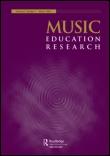
Music Education Research
Elevating Music Education Through ScholarshipMusic Education Research is a prestigious journal dedicated to advancing scholarship in the field of music education, published by Routledge Journals, Taylor & Francis Ltd. With a significant impact factor reflected in its Q1 ranking in Music and Q2 in Education for 2023, this journal is a critical resource for researchers, educators, and practitioners alike. It consistently ranks high in both the Arts and Humanities and Social Sciences categories, with an impressive position of Rank #8 in Music out of 180 journals, indicating its influence in shaping contemporary discourse. Aimed at fostering innovation and critical examination within music education, Music Education Research invites submissions that explore a broad spectrum of topics, encompassing pedagogical practices, policy implications, and curriculum development. Operating from the United Kingdom, the journal provides a vital platform for sharing cutting-edge research and is committed to improving music learning experiences across various educational contexts.

International Journal of Multicultural Education
Shaping equitable educational practices for all.The International Journal of Multicultural Education (IJME), published by EASTERN COLL, DEPT EDUCATION, is a leading open-access journal dedicated to advancing the field of multicultural education. Established in 2007, this journal has become an essential platform for researchers, educators, and policymakers interested in exploring the complexities of education in diverse cultural contexts. With an impressive impact factor and strong rankings in multiple categories including Q1 in Anthropology and Cultural Studies, and Q2 in both Education and Social Sciences, the IJME provides high-quality, peer-reviewed articles that contribute to impactful educational practices and scholarship. The journal's open access model ensures that its invaluable research reaches a global audience, fostering dialogue and collaboration among academics, practitioners, and students. By focusing on themes that address social justice, equity, and cultural awareness in education, the IJME plays a critical role in shaping inclusive and effective educational frameworks for the future.

Philosophy of Music Education Review
Unpacking the Cognitive and Emotional Layers of Music TeachingThe Philosophy of Music Education Review, published by Indiana University Press, is a premier academic journal dedicated to advancing the interdisciplinary discourse surrounding music education, philosophy, and the arts. With a notable impact factor dynamic, this journal has established itself as a significant voice, achieving Q1 rankings in both Music and Philosophy, and a Q3 classification in Education, reflecting its broad appeal and scholarly contribution. Covering prolific topics from 2019 to 2024, this journal offers insightful articles and critiques that stimulate critical thinking and enhance pedagogical practices within the realm of music education. It boasts impressive Scopus rankings in relevant categories, placing it favorably among its peers and showcasing its importance in the academic landscape for educators, researchers, and students alike. While it is not an open access journal, the philosophy and studies within its pages remain pivotal for those invested in the cognitive, emotional, and cultural dimensions of music teaching and learning.
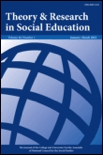
THEORY AND RESEARCH IN SOCIAL EDUCATION
Elevating Pedagogical Strategies for Social ChangeTHEORY AND RESEARCH IN SOCIAL EDUCATION is a leading academic journal that publishes high-quality research on the intricacies of social education, aiming to bridge theory and practice in the field. Established in 1973 and renowned for its scholarly contributions, this journal is published by Routledge Journals, Taylor & Francis Ltd, offering an esteemed platform for educators, researchers, and policy-makers alike. With an impressive impact factor and ranking in the top quartile (Q1) in both the Education and Sociology and Political Science categories, it provides a highly regarded venue for the latest research and theoretical developments. The journal embraces a diverse scope encompassing critical issues, innovative methodologies, and pedagogical strategies in social education, essential for those seeking to deepen their understanding and influence in the field. Although it does not currently offer open access, the rigorous peer-review process ensures that the content remains of the highest quality. By contributing to this journal, researchers can engage with a wide audience, fostering academic dialogue and practical applications that advance social educational practices.
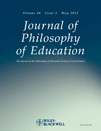
JOURNAL OF PHILOSOPHY OF EDUCATION
Exploring the Intersection of Thought and Learning.JOURNAL OF PHILOSOPHY OF EDUCATION, published by Oxford University Press, serves as a premier platform for interdisciplinary research at the intersection of education, history, and philosophy. Established in 1967, this journal has consistently contributed to the academic discourse by publishing insightful articles that challenge conventional thinking and inspire innovative pedagogical practices. With a distinguished ranking in the top quartiles of History and Philosophy and a respectable Q3 position in Education, it occupies a significant niche in the scholarly community. The journal's high Scopus rankings signify its impact, being placed in the 94th percentile for History and the 86th percentile for Philosophy. It welcomes contributions that explore theoretical frameworks, historical contexts, and practical implications of philosophical inquiries into education. Although it does not currently offer Open Access options, the journal remains a vital resource for academics and practitioners seeking to deepen their understanding of educational philosophy. With contributions expected to continue until 2024, the JOURNAL OF PHILOSOPHY OF EDUCATION is poised to remain a crucial avenue for advancing educational thought and research.
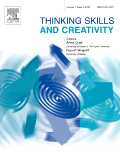
Thinking Skills and Creativity
Exploring the Intersection of Thought and ImaginationThinking Skills and Creativity is a leading peer-reviewed journal published by ELSEVIER SCI LTD, dedicated to advancing knowledge in the fields of education, cognitive psychology, and creative thinking. With an impressive impact factor and a Q1 ranking in the Education category, this journal serves as an essential platform for researchers, educators, and practitioners who are passionate about fostering innovative thought patterns and critical thinking skills. Since its inception in 2006, this journal has covered a wide array of topics related to the development and assessment of thinking skills, highlighting research that encourages creativity in educational settings. Though it is not an Open Access journal, it remains widely accessible through university libraries and subscriptions. With a focus on bridging theory and practical application, Thinking Skills and Creativity continues to play a pivotal role in shaping how educators cultivate students' cognitive abilities around the world, making it a vital resource for anyone interested in the intersection of creativity and learning.
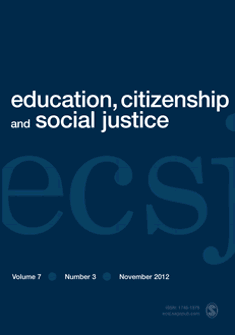
Education Citizenship and Social Justice
Connecting education to the heart of social justice.Education Citizenship and Social Justice is a prominent academic journal published by SAGE Publications Inc, dedicated to advancing the discourse around education's role in citizenship and social justice issues. Since its inception in 2006, the journal has provided a critical platform for researchers, educators, and policymakers to explore the intersections of education, citizenship, and equity within diverse societal contexts. With an impressive ranking of #685 out of 1543 in the Social Sciences - Education category and a 2023 Quartile 2 status, it is firmly established as a significant resource in its field. Although the journal does not currently operate with an open access model, its impact on the education sector remains profound, offering valuable insights that contribute to the development of inclusive educational practices. Researchers and students alike will find the journal's rigor and commitment to social justice principles vital as they navigate the evolving landscape of educational research and policy.
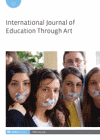
International Journal of Education through Art
Cultivating a Community of Artful Educators.International Journal of Education through Art, published by INTELLECT LTD, serves as a pivotal platform for exploring the intersection of education and the arts. With an ISSN of 1743-5234 and E-ISSN of 2040-090X, this journal provides a rich repository of research and discourse in the fields of arts and humanities as well as education, holding a commendable Q2 ranking in the Arts and Humanities category and Q3 in Education for 2023. Based in the United Kingdom, the journal has evolved significantly since its launch in 2012, with a converged publication trajectory extending through 2024. Notably, its Scopus rankings reflect a strong performance in both general arts and humanities (ranked #34/173, 80th percentile) and education (ranked #1095/1543, 29th percentile), highlighting its scholarly impact. Fostering an inclusive academic community, the International Journal of Education through Art invites researchers, educators, and professionals to submit their innovative findings and theoretical insights, facilitating discourse that bridges artistic practices and educational methodologies. While access options are not openly available, the journal remains an essential resource for those seeking to enrich their understanding of educational practices through artistic expression.

Linhas Criticas
Empowering voices through interdisciplinary research.Linhas Críticas is a prominent open access journal published by UNIV BRASILIA, dedicated to fostering scholarly discourse in the fields of social sciences and humanities. With ISSN 1516-4896 and E-ISSN 1981-0431, the journal has been fully accessible since 2014, reflecting its commitment to disseminating high-quality research to a global audience. Positioned as a vital resource for researchers, professionals, and students alike, Linhas Críticas offers a platform for innovative ideas and critical analyses that engage with contemporary social issues, theories, and practices. The journal aims to enhance interdisciplinary understanding and foster dialogues that contribute to academic growth. By emphasizing rigorous peer-reviewed articles, Linhas Críticas continues to establish itself as an essential publication for those seeking to explore and contribute to critical thought in Brazil and beyond.